From Observers to Prey
By: Giorgio Provinciali
Live from Ukraine ????????
Kyiv The Free the Word (Зв?льнити Слово) event, organized by the National Union of Journalists of Ukraine, took place on Thursday in the beautiful setting of the former Dynamo Lux Club. Dedicated to raising awareness about the fate of Ukrainian journalists who have endured captivity after being unjustly arrested or held hostage by the Russians, the event was made possible thanks to the financial support of the International Commission on Missing Persons (ICMP), through the Norwegian Agency for Development Cooperation in Ukraine (NORAD).
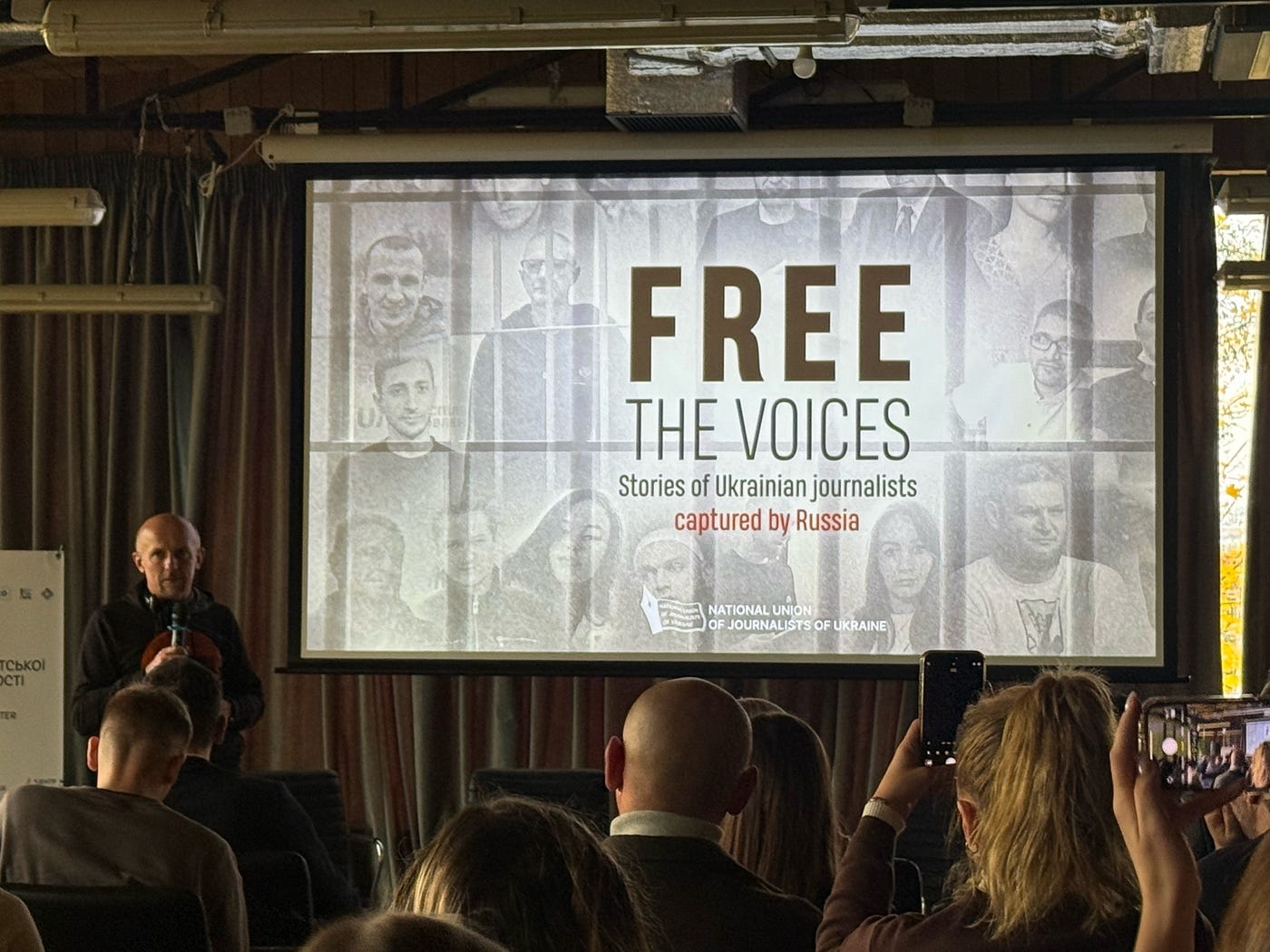
During the conference, both live and through a short film, we heard the testimonies of those who, like us, work under very difficult conditions to ensure that true, live information does not fall victim to the blows ofan enemy that systematically violates every rule of international law and spreads poison in the global information space. On the battlefield and in the cities, the Russians have shown that in the war they have started against Ukraine, neither the rules learned in international law textbooks nor the conventions signed in government chambers apply.
In this war, theory dies with the first shot fired.
The Geneva Conventions state that civilians, medical personnel, and journalists must be protected. But these rules only apply if both sides honor them. The Russian Federation does not.For years, Moscow has systematically ignored every fundamental principle of the laws of war: it has struck hospitals, oncologic clinics, maternity wards, churches, UN humanitarian convoys, refugee camps, schools, newsrooms, and nuclear power plants. It has destroyed dams, energy hubs, and entire population centers in an attempt to weaken Ukrainian resilience.
Although it is meant to signify protection, the word PRESS often makes its bearer a prime target.
For a Russian drone or sniper, that symbol indicates three things: someone is filming there, theres movement, and theres coverage. The result is that fire is focused on that area. The voices that cannot be silenced forever in this way are seized and arbitrarily held by the Russians as bargaining chips.
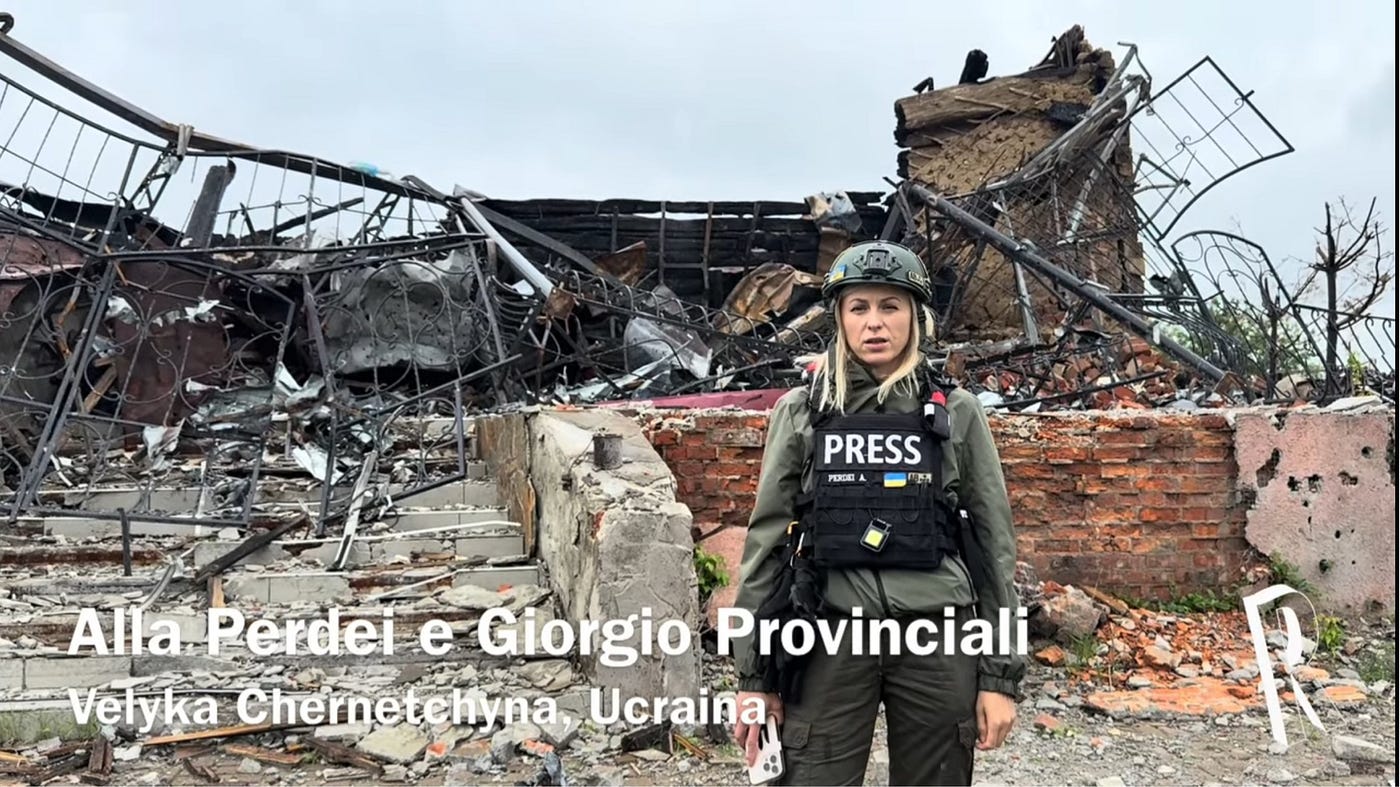
Since 2014, at least 120 Ukrainian journalists and foreign media workers have been kidnapped or imprisoned by Russian forces. This happened to Serhiy Zyhipa, who was captured in Nova Khakovka, and to Iana Suvorova and Anastasia Hlukhovska, arrested during the occupation of Melitopol. Their testimonies, revealed during the conference, expose a shocking fact:there isnt even an official intermediary to negotiate exchanges or determine the prisoners conditions. Sleep deprivation, starvation, and beatings are common in a terrorist state like the Russian Federation. Many journalists die this way: from hunger or torture. Among the most notorious cases is that of Viktoriia Roshchyna, who disappeared in August 2023 while reporting in Ukrainian territories illegally occupied by the Russian Federation. Her body was returned only in February 2025: mutilated and missing vital organs. Her death illustrates what can happen to those who continue reporting.
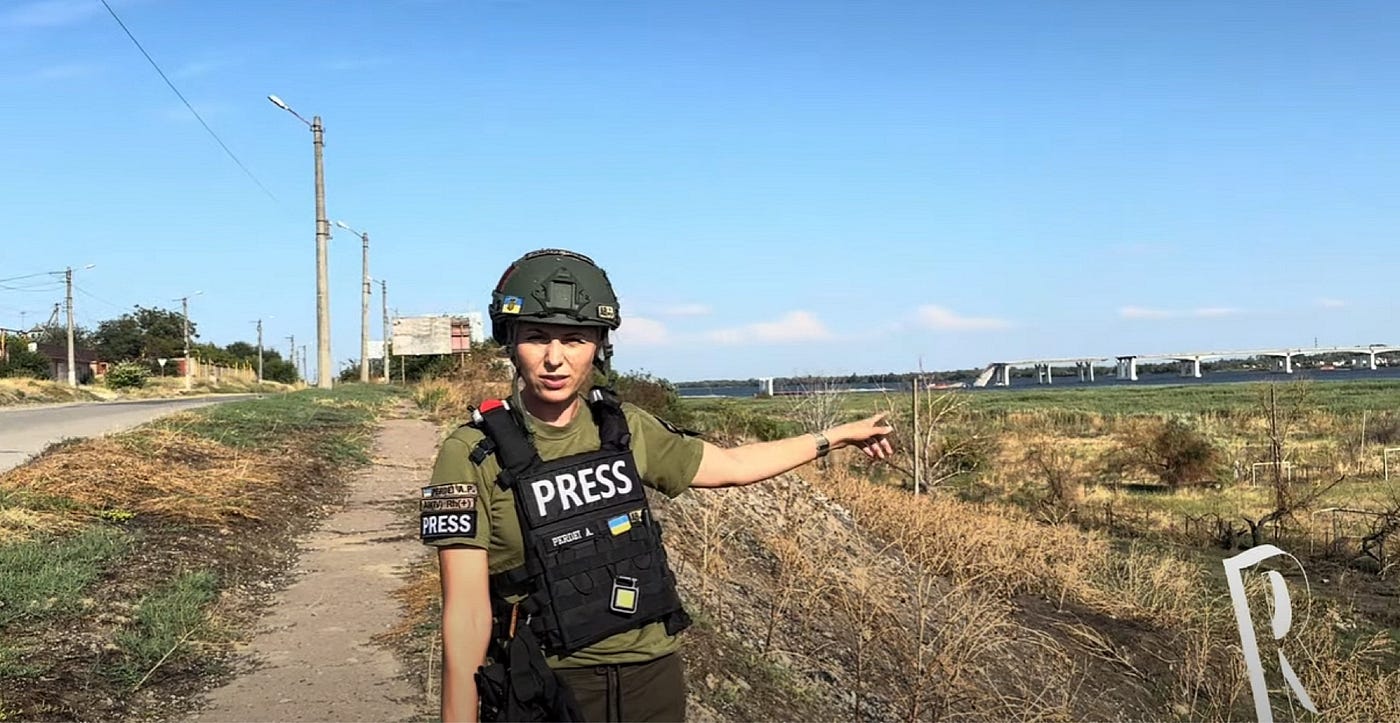
Being recognizable as a journalist often raises vulnerability not only to gunfire but also to kidnapping: reporting from disputed areas or beyond the lines makes one a potential hostage.Press protection rules become useless when someone shifts from observer to prey.The Russian Federation pretends legality through arrests and show trials for espionage, terrorism, or sabotage, which only serveto normalize kidnapping as a legitimate act, even though they arecoercive and intimidating tactics meant to silence witnesses.
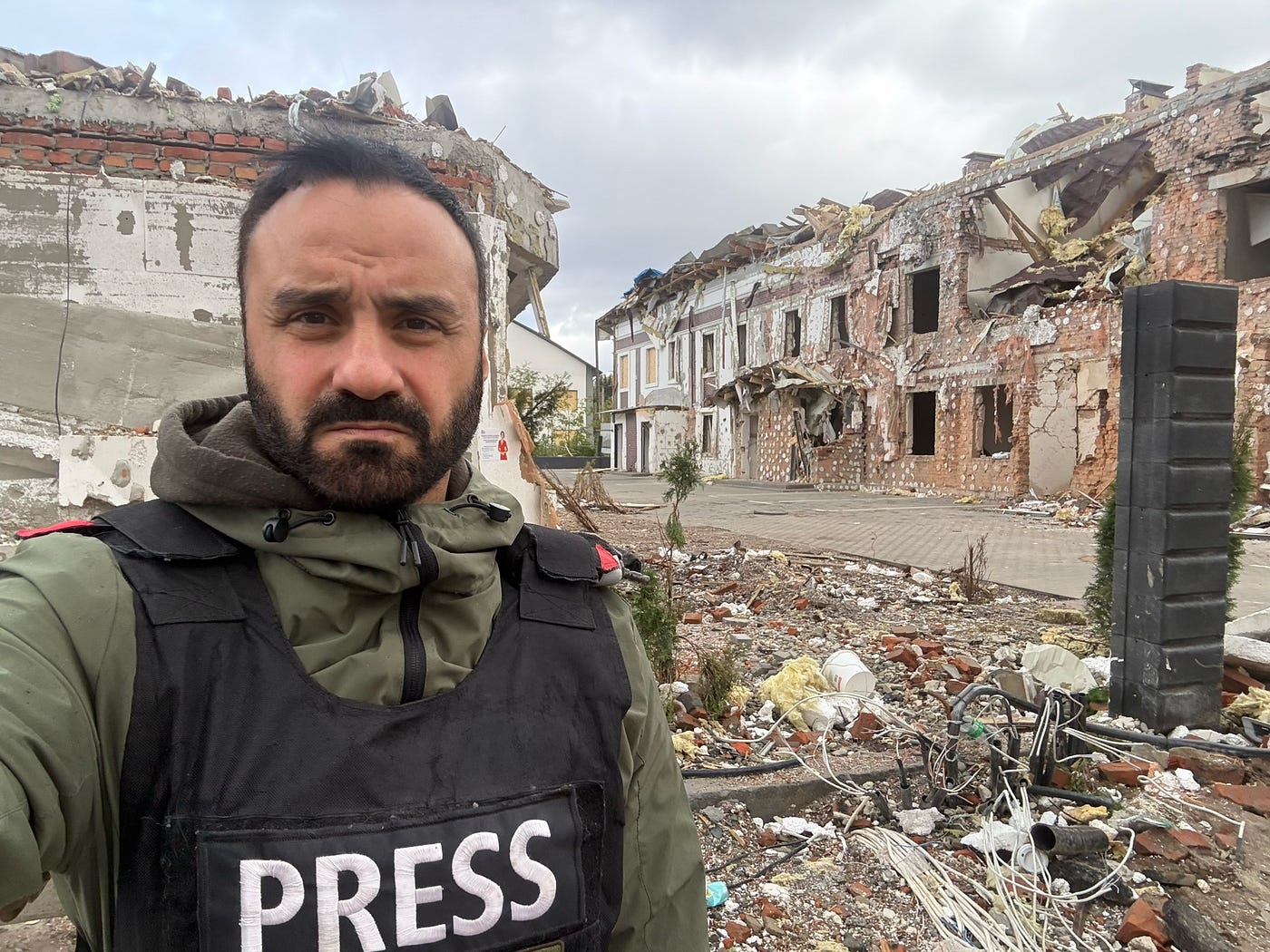
A clear example is Ukrainian journalist Vladyslav Yesypenko, who was arrested in March 2021 in Crimea on unfounded charges of espionage and manufacturing explosives. Released only in June 2025 after four years of imprisonment and torture, he stands as living proof of how Russia perceives information as a threat. Faced with an enemy that abuses children, shoots civilians, rapes, and systematically uses torture,the word PRESS often fails to offer protection; instead, it attracts attack and arrest.
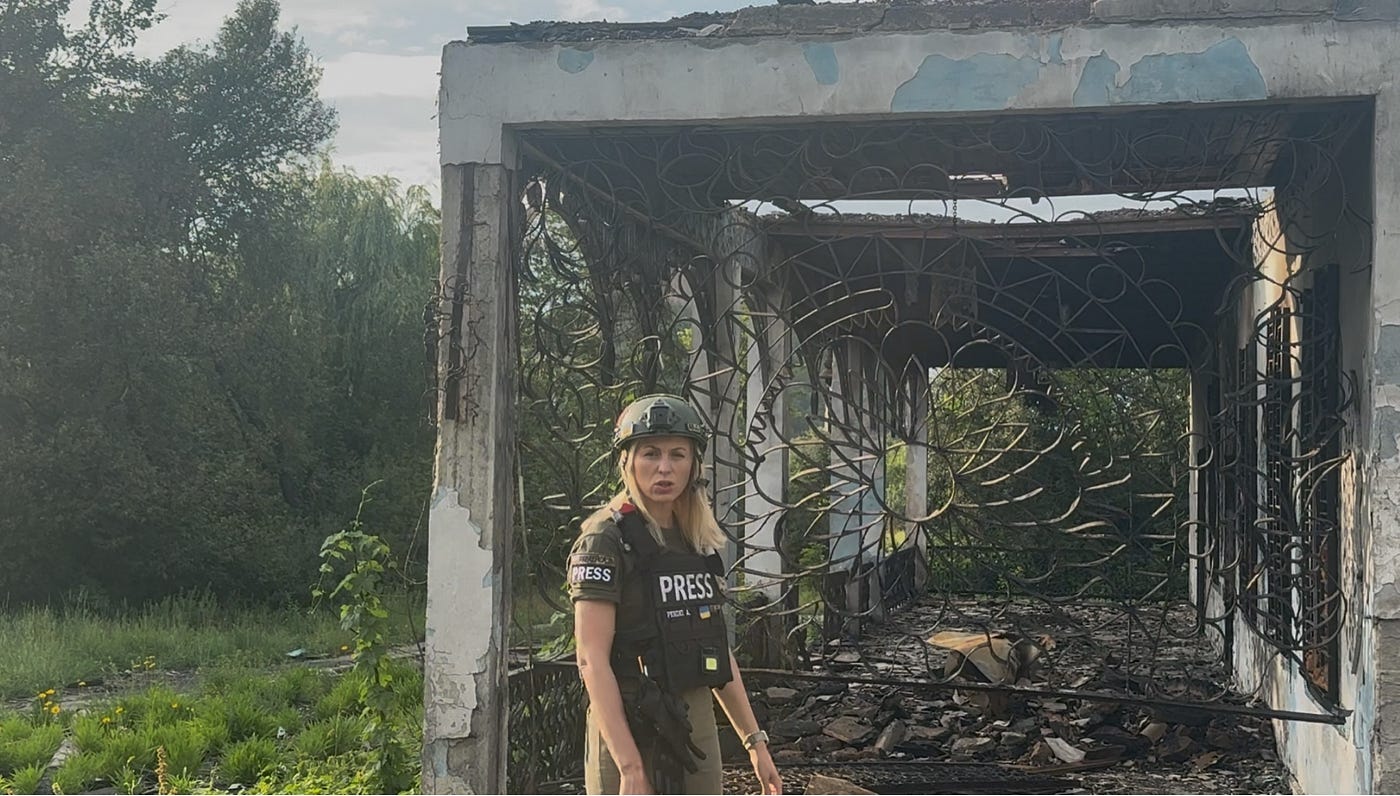
At the symposium, it became clear that these were not accidents but deliberate policies of intimidation and erasure of memory. I myself feel the weight of that inscription. Countless times, Ive been advised to remove it because it would only expose me to greater risks. Several times, our press car has been targeted by direct attacks from Russian drones or other unmanned aircraft.
Talking about violations of international law as if it were a protective shield fails to fully grasp the reality of the Russian front.Protection does not depend on law but on those who respect it. And in this war, Russia does not respect it.
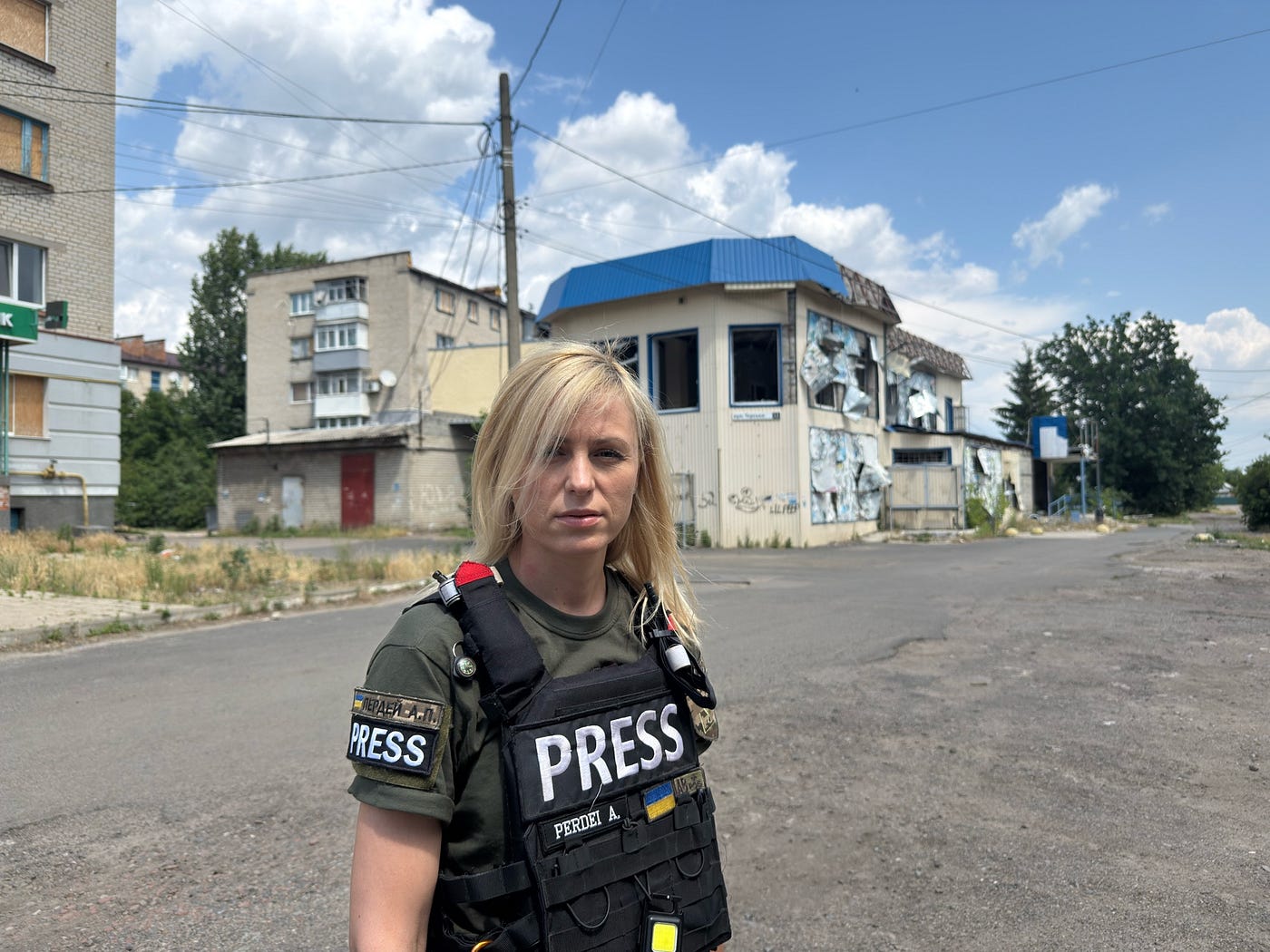
The Kyiv seminar opened a path of reflection. In three years of war, spent continuously on the front lines and in the most affected areas, Ive noticed thatcountries like Italy must work hard to train media workers sent to these war zones. Disoriented, poorly educated about the dynamics and real risks, still clinging to abstract concepts that clash with reality, many journalists end up beingfrontline misfits. Sometimes reliant on fixers who they often depend on for language help, geographic knowledge, and basic references in a country or, conversely, dangerously reckless enough to expose themselves to serious risks, many Italian media workers sent here for short stays suggest that significant preparation is needed upfront.
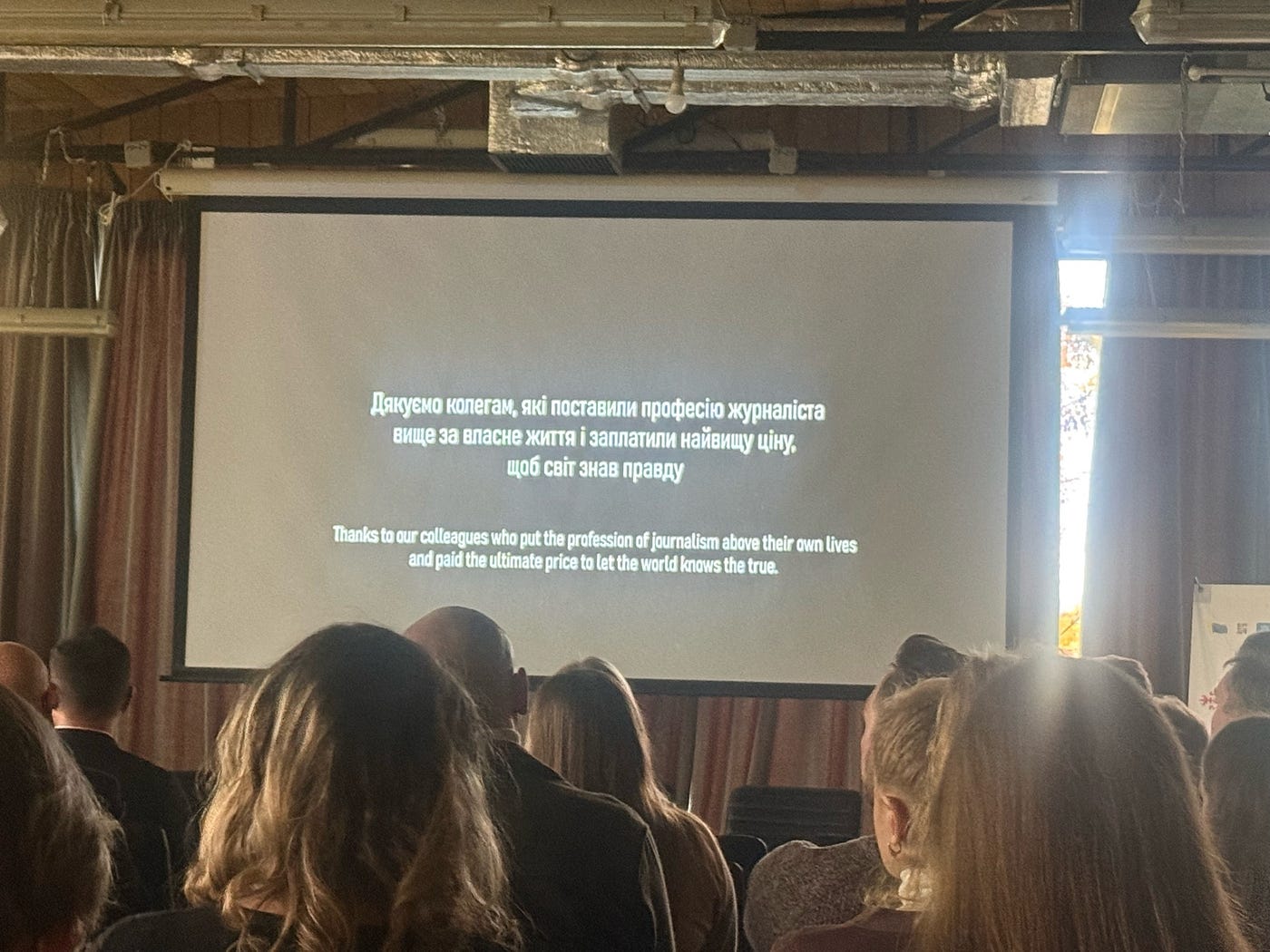
????THANKS TO ALL WHO SUPPORT OUR WORK BY SHARING OUR ARTICLES AND BACKING OUR CROWDFUNDING CANPAIGN????????????
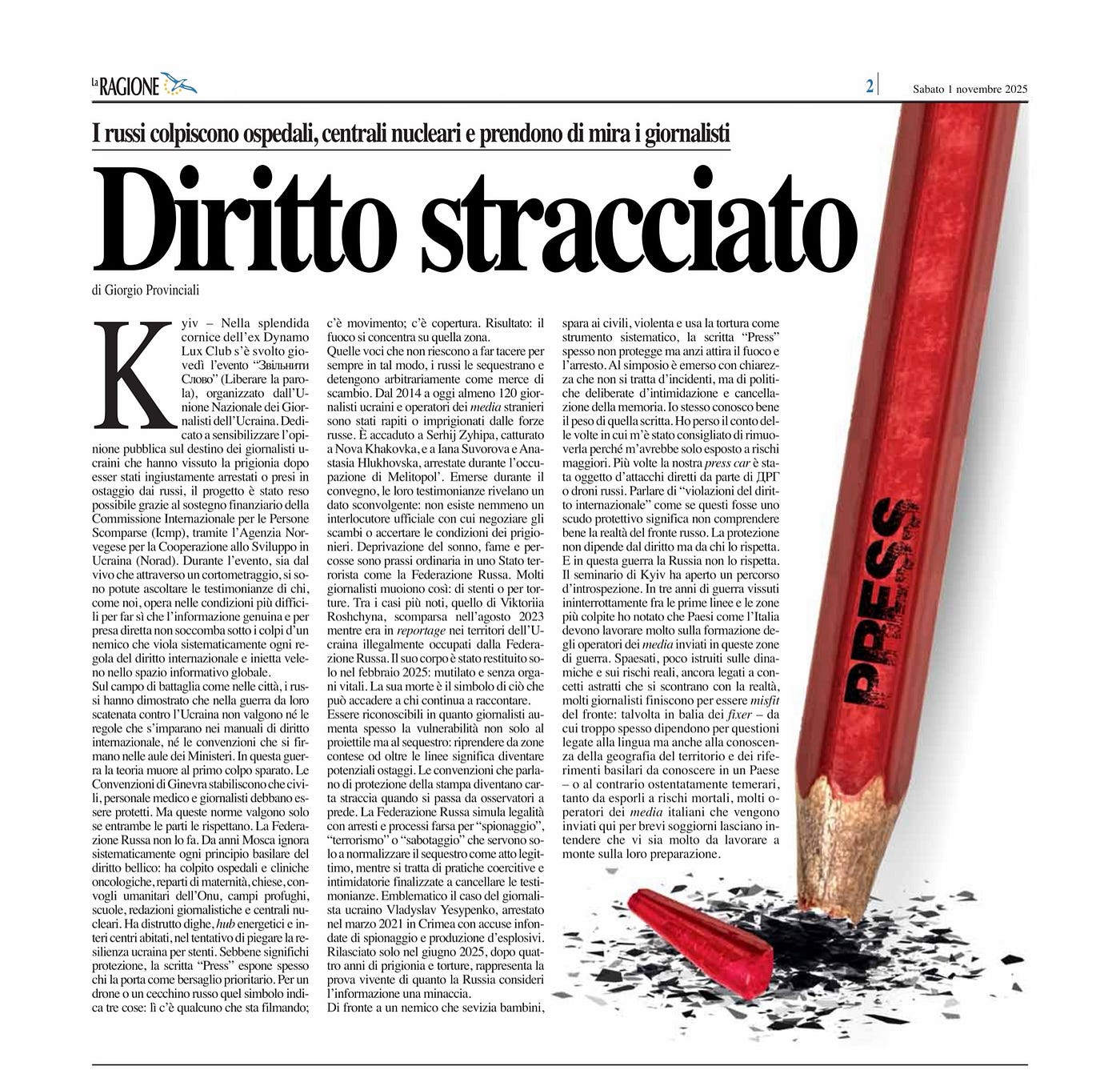
????感謝所有通過分享我們的文章和支持我們的眾籌活動來支持我們工作的人????????????
????????幫助我們購買反無人機的РЕБ?設備????????????
在過去的三年裏,作為自由撰稿人,我們一直在烏克蘭戰爭的所有前線進行報道,自從大規模
https://www.paypal.com/pools/c/9jdpPchpGi
從觀察者到獵物
作者:Giorgio Provinciali
來自烏克蘭????????的現場報道
基輔由烏克蘭國家記者聯盟主辦的自由之言(Зв?льнитиСлово)活動於周四在曾經的迪納摩盧克斯俱樂部的美麗場地舉行。此次活動旨在提高人們對烏克蘭記者命運的認識,他們被俄軍不公正逮捕或被扣為人質後遭受囚禁。此次活動得到了國際失蹤人員委員會(ICMP)通過挪威對烏克蘭反正合作署(NORAD)的財務支持。
(圖:我在本文描述的活動中拍攝的一張照片版權所有,Giorgio Provinciali)
在會議期間,我們通過現場和短片聽取了那些像我們一樣在極其艱難條件下工作的人的證詞,以確保真實、實時的信息不會成為係統性違反國際法每一條法則、在全球谘詢空間中傳播毒素的敵人打擊的受害者。無論在戰場上和城市中,俄羅斯人都已經表明,在他們對烏克蘭發動的戰爭中,無論是國際法教科書中學到的規則還是國家政府簽署的公約,俄羅斯人都不會遵守。
在這場戰爭中,道理隨著第一聲槍響而滅亡。
《日內瓦公約》規定,平民、醫務人員和記者收到保護。但這些規則隻有在雙方都遵守時才有效。俄羅斯聯邦不遵守。多年來,莫斯科一直係統性地無視戰爭法的每一項基本原則:它襲擊醫院、癌症診所、婦產病房、教堂、聯合國人道主義車隊、難民營、學校、新聞機構和核電站。它摧毀大壩、能源樞紐和整個居民區,試圖削弱烏克蘭的複原力。
盡管PRESS一詞旨在象征著保護,但它常常使攜帶者成為主要目標。
對於俄羅斯的無人機或狙擊手來說,這個符號表明三件事:有人在拍攝、有人在移動、有人在報道。這導致火力集中在那個區域。如果這樣做不能讓這些聲音永遠沉默,俄羅斯人會即抓住並隨意扣押發聲的記者,作為他們談判的籌碼。
(圖:Alla在烏克蘭蘇梅市維萊卡切爾內奇娜報道????????版權所有,Giorgio Provinciali)
自2014年以來,至少有120名烏克蘭記者和外國媒體工作者被俄軍綁架或關押。這其中包括在諾瓦哈科夫卡被捕的謝爾蓋茲希帕,以及在梅利烏波爾占領期間被捕的雅娜蘇沃羅娃和阿納斯塔西婭赫盧霍夫斯卡。他們在會議中披露的證詞揭露了一個令人震驚的事實:甚至沒有官方中介機構去談判交換或確定囚犯的條件。在像俄羅斯聯邦這樣恐怖主義國家,戰俘被剝奪睡眠、饑餓、毆打折磨是司空見慣的。許多記者就這樣死於饑餓或酷刑。其中最臭名昭著的案例之一是維多利亞羅施琴,她於2023年8月在烏克蘭被俄羅斯非法占領地區報道時失蹤。直到2025年2月,她的遺體才被歸還:肢體殘缺,重要器官缺失。她的死說明了那些繼續報道的人可能會麵臨的危險。
(圖:Alla指向的是烏克蘭一個最危險的地點:赫爾鬆的安東尼夫斯基橋版權所有,Giorgio Provinciali)
被認出是記者通常會增加被攻擊的風險,不僅是遭受槍擊,還可能被綁架:在有爭議地區或越過前線報道,意味著可能成為人質。當你從觀察者轉向獵物時,新聞保護規則就變得毫無用處。俄羅斯聯邦通過對間諜活動、恐怖主義或破壞進行逮捕和審判來偽造合法性,這些隻是將綁架作為合法行為正常化盡管這些旨在讓證人閉嘴的脅迫和恐嚇的手段。
(圖:我在基輔,在俄軍對平民目標襲擊後現場報道版權所有,Giorgio Provinciali)
一個明顯的例子是烏克蘭記者瓦迪斯拉夫葉西賓科,他於2021年3月在克裏米亞以毫無根據的間諜和製造炸藥的指控被逮捕。經過四年監禁和酷刑後,他直到2025年6月才獲釋,他的經曆成為俄羅斯如何將信息視為威脅的活生生的證據。在麵對虐待兒童、槍殺平民、強奸和係統性使用酷刑的敵人,新聞工作者這個詞往往無法提供保護,反而成為攻擊和逮捕的目標。
(圖:Alla在烏克蘭多布羅波利亞報道????????版權所有,Giorgio Provinciali)
在研討會上,這一點變得很清楚:這些事件非意外,而是蓄意實施的恐嚇和抹除記憶的政策。我本人也深感這個銘文的沉重。無數次,我被建議將其移除,因為那樣隻會讓我麵臨更大的風險。我們的新聞車也曾多次遭到俄軍無人機或其他無人駕駛飛機的直接襲擊。
把違反國際法當作保護盾來談論,意味著你未能充分認清俄羅斯前線的現實。保護並不依賴法律,而依賴那些尊重法律的人。而在這場戰爭中,俄羅斯是不存在尊重法律的。
(圖:Alla在烏克蘭頓巴斯地區斯洛維揚斯克報道????????版權所有,Giorgio Provinciali)
基輔的研討會開啟了一條反思之路。在三年的戰爭中,我一直在前線和受影響最嚴重的地區工作,我發現像意大利這樣的國家必須努力培訓被派往這些戰區的媒體工作者。許多記者由於迷失方向、對局勢和真實風險的了解不足,仍然執著於一些與現實衝突的抽象概念,最終成為前線的邊緣人。有時他們依賴修複者依賴他們提供的語言幫助、地理知識和當地的基本信息或者相反,他們極其魯莽,輕易暴露自己於嚴重的危險中。許多短期派駐這裏的意大利媒體工作者建議,需要事先做好充分準備。
(圖:我在本文介紹的會議上拍的照片,地點:利沃夫,烏克蘭????????版權所有,Giorgio Provinciali)
(圖:我在意大利報紙《La Ragione》上的專欄版權所有,Giorgio Provinciali)




